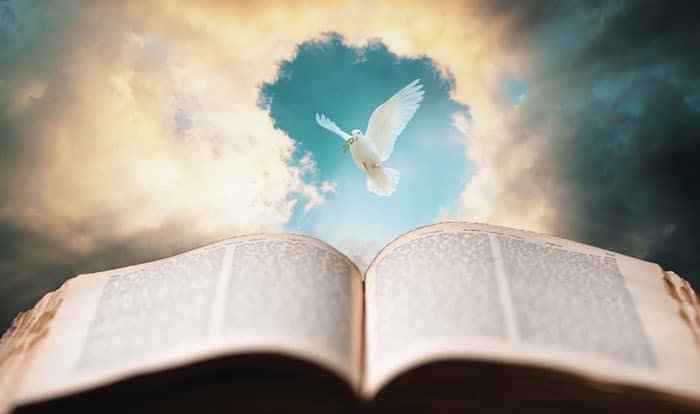
On October 7, 2023 the world was shaken by the Simchat Torah Massacre in Israel. I believe it’s no accident that the greatest massacre of Jews since the Holocaust occurred on Simchat Torah, the day on which Jews rejoice in the gift of Torah: the first five books and the cornerstone of the Bible. King Solomon said, “The Torah… all of its paths are peace.” (Proverbs 3:17.) So we must ask, how could such a war break out on that day? How could so much violence and worldwide antisemitism be unleashed on that day?
Since neither diplomacy nor combat have produced a lasting and secure peace in Israel, let us examine the Torah path to peace in the Holy Land.
Perhaps it’s a message that we need to try something different. Since neither diplomacy nor combat have produced a lasting and secure peace in Israel, let us examine the Torah path to peace in the Holy Land.
The Jewish claim to the land in question is rooted in Torah. The Jewish nation that was established there 3300 years ago resulted from a war of independence against Canaanite tribes notorious for sacrificing their children to propitiate idols of wood and stone as well as other acts of barbaric violence. As recorded in the Bible, God does not tolerate such practices in the Holy Land, so He gave it instead to the descendants of Abraham, Isaac and Jacob — the Children of Israel — who had been enslaved in Egypt for hundreds of years. There is no way the Jews could have escaped Egypt or won that war without God’s help.
The Torah functions as the Jewish lawbook. It could have opened with the first laws given to the Jewish nation as it emerged from slavery in Egypt (see Exodus 12:1). It opens instead with the story of Creation to teach that the same God who created the world can and will allot the lands of the world as He wishes.
God demanded one thing from the Jews in return: Adherence to the commandments of the Torah. The Torah functions as the Jewish lawbook. It could have opened with the first laws given to the Jewish nation as it emerged from slavery in Egypt (see Exodus 12:1). It opens instead with the story of Creation to teach that the same God who created the world can and will allot the lands of the world as He wishes (Rashi).
It doesn’t matter that later generations didn’t “sign the contract” like the Jews who emerged from Egypt. Every Jew is commanded to live a Jewish life. The reward is peace, both external and internal; hence “all of its paths are peace.”
God promised at the outset that He would never abandon us, but He also said we would lose the land if we stopped observing the commandments of Torah, the mitzvahs. Jewish sovereignty over the Holy Land lasted for 1,000 years. Take a moment to think about how established America seems after 250 years, and then reflect on the nation of Israel which stood for 1,000 years. Sadly, our adherence to the mitzvahs and the spiritual level of the nation kept declining until God fulfilled both promises: we lost sovereignty over the land and yet, God never abandoned us. Despite rabid antisemitism and violent persecution in every generation, Israel lived on – the only landless nation to perform this feat for 2,500 years. Every other nation that lost its land – and there are hundreds of them – became extinct. Many Jews and non-Jews alike believe this miraculous Jewish survival is strong evidence that God and the Bible are true.
And then another miracle: after 2,500 years of Jewish longing and daily prayer for the restoration of Israel to the Holy Land, it finally happened. But it did not happen in a vacuum.
During those 2,500 years, the land passed from one colonizing empire to another: Babylonian, Persian, Greek, Roman, Byzantine, Islamic, Crusader, Mamluk, Ottoman and British, to name a few. It was the Romans who named the region Palestine 2000 years ago as an insult to the Jews, because we’d fought many ancient wars against the neighboring Philistines.
The modern Zionist movement began in the late 19th century when the region had lain desolate for centuries. Mark Twain observed during this period, “There is not a solitary village … for 30 miles in either direction. There are two or three small clusters of Bedouin tents, but not a single permanent habitation. One may ride 10 miles, hereabouts, and not see 10 human beings … Of all the lands there are for dismal scenery, I think Palestine must be the prince … Can the curse of the Deity beautify a land? …Over it broods the spell of a curse that has withered its fields and fettered its energies.”
Jews began purchasing land in the Palestinian region of the Ottoman Empire because even that parched, hardscrabble land was better than the pogroms and massacres Jews suffered every few years in Europe. They bought wasteland acres from locals thrilled to suddenly find a buyer, and they engaged in the back-breaking labor of reclaiming those acres from the desert.
As their orchards and farms began to bear fruit, Arabs came from neighboring Syria, Lebanon and Egypt to work in the fields and provide services to the growing population. Many of these people would later be called Palestinian Arabs. Some Arabs already lived there, just as some Jews had always lived there, but both groups expanded rapidly as the Jews returned from Europe, Africa and the Arab nations, as well as Asia and America.
As the two populations multiplied in the 20th century, the British colonizers who’d replaced the Ottomans after World War I had a difficult time controlling them. Full-scale riots broke out in 1929 after Arabs massacred 133 Jews in Hebron. A plan emerged for Britain to leave the land of Israel and cede sovereignty to the Jewish and Arab populations – a 50/50 land split between them.
It was in this context that the original two-state solution was born. However, due to the furious protest of the Arabs, they received 80% of the Holy Land while the Jews were given 20%. These countries came to be called Jordan and Israel. For the radical Palestinian Arabs, however, 80% wasn’t enough.
The radical Palestinians didn’t refuse the two-state solution because there were more of them than the Jews, nor because they had more history in the Holy Land, nor because they had a stronger archeological claim. They had none of these things. They refused because they considered it a stain on their honor to have a Jewish nation in the midst of the Arab Muslim world.
When the State of Israel was created by the United Nations in 1948, five Arab nations immediately attacked, and Israel miraculously survived. The pattern was repeated in 1956, 1967 and 1973. Each time Israel was attacked, it grew stronger. The Arab nations respected that and made peace with Israel, but the radical Palestinians shifted their attack from armies to guerillas to terrorists. Ever hoping to establish a peaceful solution, Israel repeatedly offered the radical Palestinians their own country in the West Bank and Gaza.
The radical Palestinians refused the two-state solution over and over again because one of those states would be Israel. So they proclaim, “Free Palestine from the river to the sea!” In other words, they demand that the ancient homeland of the Jewish people be free of Jews. Every Palestinian leader has repeated and pledged this goal. It is the reason Hamas was created, spelling out its mission clearly in its founding charter (see Hamas Covenant 1988). It is the same reason Arafat refused a Palestinian state when it was offered to him in the West Bank.
There is a map which is typically offered by pro-Palestinian activists, showing the encroachment on a Palestinian state by the Jews. This map is misleading for two reasons: 1) there never was a Palestinian state. Depending on the era, the land in question was either Israel or a region of some larger empire. 2) Israel represents a tiny sliver, less than 1/100 of the land mass of the Arab world. To say that radical Palestinians have no place to go in the Arab world is ludicrous. Jews have no place to go in that world. In fact, when Israel was created, nearly a million Jews were expelled from the surrounding Arab nations. They had only one Jewish nation in the world to welcome them. If a Palestinian seeks to relocate to a nation that speaks his language and practices his religion, he has more than 30 countries to choose from, and a land mass so large it encompasses the curvature of the earth.
As for the radical Palestinian lie that Israel is a racist, apartheid state, one has only to visit Israel to see the truth. Two million Israeli Arabs — 20% of Israel’s population — live, work, vote and hold office in Israel. The difference between this group and the radical Palestinians is that the Israeli Arabs accept the existence of Israel and live in peace alongside their Jewish brothers. In fact, they enjoy more civil liberties there than their Arab brothers in the Arab nations where gays are persecuted, there is no free press, and women are systematically exploited. Israelis are also black, brown, Asian, Christian, and Muslim, and they’re all equally free.
Now let us examine what the Torah says about who is permitted to live in the land of Israel when the Jews have sovereignty there. The word “permitted” is important because it presupposes that a person wants to live among the Jews, rather than kill them. This person is known as the “ger toshav,” the resident stranger.
The ger toshav is permitted to live among the Jews provided he commits to live in peace with them, and he accepts upon himself the seven commandments which obligate all humans according to Torah (Avodah Zara 64b). Known as the Noahide Laws, these commandments form the basic legal code of humanity (Sanhedrin 56a). Israeli Arabs live by these laws.
The radical Palestinians violate every single one:
1. Pursue a just society. They wage a campaign of terror against Israel and their own people in order to attract international aid, which they use to fund continuing terror and the vast personal fortunes of their leaders. The radical Palestinian justice system is thus entirely corrupt.
2. Do not curse God’s name. They behead babies, burn elders, rape women and kidnap children in the name of God.
3. Do not commit idolatry. The radical Palestinians sacrifice their own children in the name of their religion – a cult of death.
4. Do not violate sexual prohibitions. The radical Palestinians raped countless women in the October 7 attacks and have always used rape as an instrument of terror.
5. Do not murder. They murdered 1400 Israelis in the October 7 attacks, in addition to all the Israeli civilians who’ve been killed in previous terror attacks, and they murder their own people by using them as human shields.
6. Do not steal. The radical Palestinians routinely steal the massive aid sent by sympathetic nations to enrich their corrupt leadership.
7. Do not tear a limb from a living animal, and how much more so a human being. The radical Palestinians beheaded babies on October 7 and regularly dismember Israelis with terrorist bombs.
For all these reasons, the radical Palestinians have surrendered their right to live in the land of Israel. The practical question is who will take in these violent, brainwashed people who refuse to live in peace even when they have their own territory in Gaza, a place within which Israel has maintained no force or control since 2005? Why is it that no Arab nation will step up to receive even a portion of the radical Palestinians? One answer is that when Jordan tried to absorb some of them in 1970, the radical Palestinians immediately attacked their host (see Black September, also known as the Jordanian Civil War) and sought to topple their government.
This practical question of there being no willing host is an important one, but if the Arab nations who speak the same language and practice the same religion as the radical Palestinians won’t take them in because they’re too dangerous, why on earth should they be permitted to live among Jews, whom they’ve promised again and again to kill?
They answer is, they’re not permitted. People who do not want to live among Jews in peace are not permitted to live among Jews, period. And the history of the Holy Land demonstrates that people who do not live by the Noahide Laws, the basic laws of humanity, are eventually expelled from the land as God promised in the Torah.
And now we’ve arrived at the crux of the matter: The Torah path to peace in Israel requires more Jews to do more mitzvahs. If the Jews want to maintain sovereignty in the land when the land ejects the radical Palestinians, the Jews everywhere must live by the Torah. The more Torah we learn and the more commandments we keep, the sooner peace will come to the land, and the more lives will be saved.
Say thank you to God for your health and the blessings in your life. Pray for the blessings you need, and pray for others who need those blessings too.
So visit or call your parents. That’s a commandment. Visit or call someone who is ill. Turn off your phone on Shabbat. Better yet, keep Shabbos! Light candles. Learn Torah. Support an organization that shares Torah with the world. Pray for peace. Say thank you to God for your health and the blessings in your life. Pray for the blessings you need, and pray for others who need those blessings too. All of these are Torah commandments.
If enough of us learn Torah, keep the commandments and cry out to God in prayer, the Holy Land will eject the people who reject Torah, and peace will remain for all those who desire peace.
May we learn more Torah, keep more commandments, bring peace sooner, and save more lives!
Salvador Litvak is a writer-director based in Los Angeles. His next movie is “Guns & Moses,” a thriller about a Hasidic rabbi who investigates a series of murders, starring Mark Feuerstein, Neal McDonough, Dermot Mulroney and Christopher Lloyd.
As the Accidental Talmudist Sal shares authentic accessible Torah with a worldwide audience. Learn Torah now at accidentaltalmudist.org


































 More news and opinions than at a Shabbat dinner, right in your inbox.
More news and opinions than at a Shabbat dinner, right in your inbox.